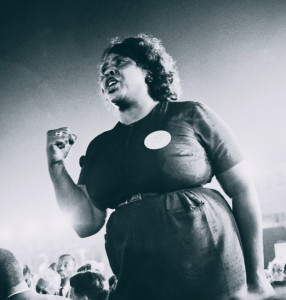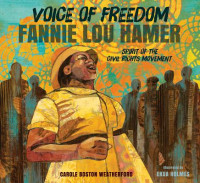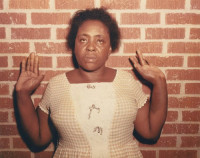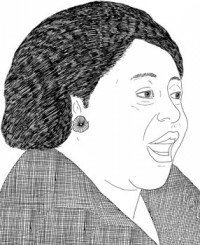




Civil rights leader Fannie Lou Hamer, spoke words that are all too relevant today. Mrs Hamer would have turned 100 years old on October 6th 2017. Today on Making Contact, youll hear archival recordings, and excerpts from a powerful new film featuring Fannie Lou Hamers contemporaries-- themselves now elders. Youll hear about the context of her life, and the lives of other sharecroppers in Mississippi from a seldom heard film produced for the Student Nonviolent Coordinating Committee or SNCC.
Fannie Lou Hamer was an American voting rights activist, a leader in the Civil Rights Movement, and philanthropist who worked primarily in Mississippi. She was instrumental in organizing Mississippi's Freedom Summer for the Student Nonviolent Coordinating Committee (SNCC). She was the vice-chair of the Mississippi Freedom Democratic Party, which she represented at the 1964 Democratic National Convention in Atlantic City, New Jersey.
In 1944, after the plantation owner discovered that she was literate, Hamer was selected as the plantation's time and record keeper. In 1945 she married Perry "Pap" Hamer. They worked together on the Marlow plantation for the next 18 years. The Hamers later raised two impoverished girls, whom they decided to adopt.
While having surgery in 1961 to remove a tumor, Hamer (at the age of 47) was also given a hysterectomy without her consent by a white doctor; this was part of the state of Mississippi's plan to reduce the number of poor blacks in the state. Hamer is credited with coining the phrase "Mississippi appendectomy" as a euphemism for the involuntary or uninformed sterilization of black women, common in the South in the 1960s.
During the 1950s, Hamer attended several annual conferences of the Regional Council of Negro Leadership (RCNL) in the all-black town of Mound Bayou, Mississippi. The RCNL, a combination civil rights and self-help organization, was led by Dr. T. R. M. Howard, a civil rights leader and wealthy black entrepreneur. The annual RCNL conferences featured panels on voting rights and other civil rights issues, as well as entertainers such as Mahalia Jackson, and speakers such as Thurgood Marshall and Rep. Charles Diggs of Michigan.
On August 23, 1962, Rev. James Bevel, an organizer for the Student Nonviolent Coordinating Committee (SNCC) and an associate of Dr. Martin Luther King, Jr., gave a sermon in Ruleville, Mississippi. He followed it with an appeal to those assembled to register to vote. Since 1890, most blacks had been disenfranchised in Mississippi by a constitution and laws that raised barriers to voter registration, such as poll tax, and literacy and comprehension tests assessed by white registrars. In the late 1950s and early 1960s, black people who tried to register to vote in Mississippi and other southern states faced serious hardships due to institutionalized racism, including harassment, loss of their jobs, and physical attacks and death. Hamer was the first volunteer to respond to Bevel's call.
She later said,
"I guess if I'd had any sense, I'd have been a little scared — but what was the point of being scared? The only thing they could do was kill me, and it kinda seemed like they'd been trying to do that a little bit at a time since I could remember."
On August 31, 1962, Hamer traveled on a rented bus with other Bevel volunteers to Indianola, Mississippi, to register. In what would become a signature trait of Hamer as an activist, she began singing African-American spirituals, such as "Go Tell It on the Mountain" and "This Little Light of Mine", to the group in order to bolster their resolve. Singing the spirituals also reflected Hamer's belief that the civil rights struggle was a deeply Christian one. That same day, after Hamer returned to the plantation, she was fired by the owner Marlow; he had warned her against trying to register to vote.
Hamer's courage and leadership in Indianola came to the attention of SNCC organizer Bob Moses. He dispatched Charles McLaurin from SNCC to find "the lady who sings the hymns". McLaurin found and recruited Hamer, and though she remained based in Mississippi, she began traveling around the South doing activist work for the organization.
On June 9, 1963, Hamer was on her way back from Charleston, South Carolina, with other activists from a literacy workshop. Stopping in Winona, Mississippi, the group was arrested on a false charge and jailed. Once in jail, Hamer's colleagues were beaten by the police in the booking room. Hamer was then taken to a cell where two inmates were ordered, by the police, to beat her using a blackjack. The police ensured she was held down during the almost fatal beating, and beat her further when she started to scream.
Released on June 12, she needed more than a month to recover. Though the incident had profound physical and psychological effects, Hamer returned to Mississippi to organize voter registration drives, including the "Freedom Ballot Campaign", a mock election, in 1963, and the "Freedom Summer" initiative in 1964. She was known to the volunteers of Freedom Summer — most of whom were young, white, and from northern states — as a motherly figure who believed that the civil rights effort should be multi-racial in nature. In addition to her "Northern" guests, Hamer played host to Tuskegee University student activists Sammy Younge Jr. and Wendell Paris. Younge and Paris grew to become profound activists and organizers under Hamer's tutelage. (Younge ultimately gave his life for the movement in 1966, when he was murdered at a Standard Oil gas station in Macon County, Alabama, for using a "whites-only" restroom.)
Featuring:
Amzie Moore, SNCC, The Student Non-Violent Coordinating Committee
Sharecroppers
Fannie Lou Hamer
Dorie Ladner and Heather Booth , Student Nonviolent Coordinating Committee.
Reverend Leslie McLemore, Mississippi Freedom Democratic Party
- KBOO


